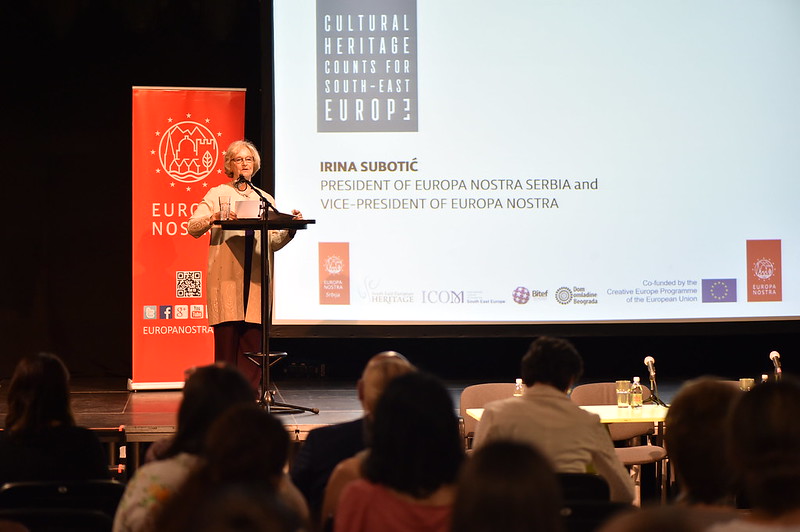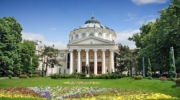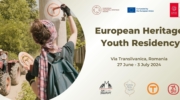Belgrade Conference: Cultural heritage is a positive and cohesive force for South-East Europe
From 15-17 June, in Belgrade, Europa Nostra, Europa Nostra Serbia and South East European Heritage Network, with the support of the EU Creative Europe Programme, held the conference “Cultural Heritage Counts for (South-East) Europe” and capacity-building days on “Education and Citizens Engagement”. These events gathered more than 150 experts and stakeholders from SEE region and other parts of Europe in discussing the approaches and challenges in measuring the impact of cultural heritage on the economy, society, culture and the environment. Reflecting on experiences and data from Western, Central, and Eastern Europe, the conference aimed to initiate a discussion about an integrated approach to heritage in relation to sustainable development among practitioners, researchers, and policy makers, while taking into account the examples and specificities of Serbia and wider Southeast Europe.
Irina Subotić, President of Europa Nostra Serbia and Vice-President of Europa Nostra, welcomed the participants in Belgrade. “The message we want to spread with this conference is the importance of regional cooperation, openness and solidarity, and also the importance of cooperation with other European and wider international actors in the heritage field, learning from different perspectives, contexts and approaches,” she stated. Irina Subotić also emphasised the serious challenges to heritage that Belgrade, Serbia and the Region are confronted with.
In her opening remarks, Sneška Quaedvlieg-Mihailović, Secretary General of Europa Nostra, pointed out the importance of the strategic partnership between Europa Nostra and European Union: “I am very grateful that our strategic partners are with us today, Dorota Nigge, representing the task force of the European Union working on the European Year of Cultural Heritage 2018, and Diego Marani, who is in charge of the cultural activities within the team of Federica Mogherini, EU High Representative for Foreign Affairs and Security Policy. Let us use these opportunities to put culture and cultural heritage in this region, and also in the relationship between this region and European Union, on a much higher level of priorities.”
Europa Nostra’s Secretary General pointed out the importance of an integrated approach to cultural heritage and joint endeavour toward the implementation of this approach in the coming years. To achieve this, Sneška Quaedvlieg-Mihailović reminded the participants of one of the main highlights of the Conference which is the public presentation of the Serbian Edition of the Executive Summary & Strategic Recommendations of the Report “Cultural Heritage Counts for Europe (CHCFE)” prepared by Europa Nostra Serbia with the support of the EU Delegation in Serbia. “Heritage has huge potential to be a positive and cohesive force for Europe in general and definitely for improving the relationship and interaction between countries, cities and citizens in the wider region of the Western Balkans. We must make the best use of this!” she concluded.
In his opening remarks, Vladan Vukosavljević, Minister of Culture and Information of the Republic of Serbia, said: “I am very glad that the Serbian Edition of the Executive Summary of this key study was presented at this conference, giving special focus to its strategic recommendations. These are: supporting evidence based policy making, measuring holistic impact, monitoring trans-related cultural heritage, sharing data, implementing an integrated approach to heritage”. The Minister pointed out that these contributions will have an imprint on Serbia’s future policy making in this field.
“I also take this opportunity to let you know that the Ministry of Culture and Media in Serbia has released to the public its first draft of the Cultural Development Strategy for the next 10 years, which also includes cultural heritage. This document includes the following strategic goals for ensuring a better protection and use of cultural heritage: strengthening the institutional and legal framework, including due reference to relevant EU policies and regulations; ensuring the use of cultural heritage as a social and economic resource; awareness raising about the value of cultural heritage; and developing inter-sectoral partnerships between diverse institutions,” the Minister concluded.
This conference was also an opportunity to put a spotlight on a Grand Prix of the EU Prize for Cultural Heritage / Europa Nostra Awards 2016 given for the outstanding Conservation Study for the Revitalization of the Stone Village of Gostuša in the Pirot District (Serbia) -, and to discuss the preparations for the European Year of Cultural Heritage in 2018, with focus on the possibilities of participation of heritage stakeholders from South-East Europe and for cooperation among EU Member States and EU Candidate Members.
During the first day of the Conference (Thursday 15 June) participants focused on wider European developments related to cultural heritage, the presentation of the outcomes of the European Report “Cultural Heritage Counts for Europe” with lectures and discussions about different approaches in evaluating heritage impact on society, and to the preparations for the European Year of Cultural Heritage in 2018.
On the second day (Friday, 16 June) the focus was on exemplary and innovative initiatives from South-East Europe, which have contributed to one of the following areas: Heritage, Environment and Sense of Place; Heritage, Traditional Skills, Training and Creativity; and Heritage, Education and Social Issues. During the evening, the participatory theatre performance “KoTo(r) o Kotoru” prepared by citizens and heritage activists of the World Heritage City of Kotor (Montenegro) was held, and followed by a panel discussion on Heritage Activism and Public Engagement.
The third day of the conference (Saturday, 17 June) was dedicated to creative exchanges of good practices and concerns between Europa Nostra members and partners from all parts of Europe with regard to heritage education, engaging marginalized groups and community engagement.
By sharing new perspectives and innovative practices from the South-Eastern part of Europe, the organisers achieved to stimulate a stronger presence and input from heritage stakeholders from South-East Europe to Europa Nostra activities and European programmes and policies.
The conference programmes involved almost 40 lecturers from 15 European countries including Aziliz Vandesande, Raymond Lemaire International Centre for Conservation, University of Leuven (Belgium), Sophia Labadi, University of Kent (UK), Dorota Nigge, 2018 European Year of Cultural Heritage task force, DG Education and Culture, European Commission, Diego Marani, Culture Policy Advisor, EEAS-European External Action Service, European Commission, Rodolphe de Looz-Corswarem, President of the European Historic Houses Association, Goranka Horjan, President, ICOM SEE, Lejla Hadžić, Board member, SEE Heritage Network, Aleksandra Kapetanović, EXPEDITIO – Centre for Sustainable Spatial Development, Kotor (Montenegro), Nicolas Bizel, Head of Operations I, European Delegation to Serbia, Balša Đuković, Nova Iskra, and Vitomir Jevremović, Digital Mind, (Serbia), Elena Mamani, NGO Cultural Heritage Without Borders (Albania), Tatjana Cvjetičanin, President of the Board, Balkan Museum Network, Belgrade (Serbia), and many others.
Media Coverage
N1 (national TV station)
Interview with Europa Nostra’s Secretary General broadcast on 16/06/2017
Newsweek (weekly news magazine)
Article published on 17/06/2017
Vecernje Novosti (national daily newspaper)
Article published on 21/06/2017








